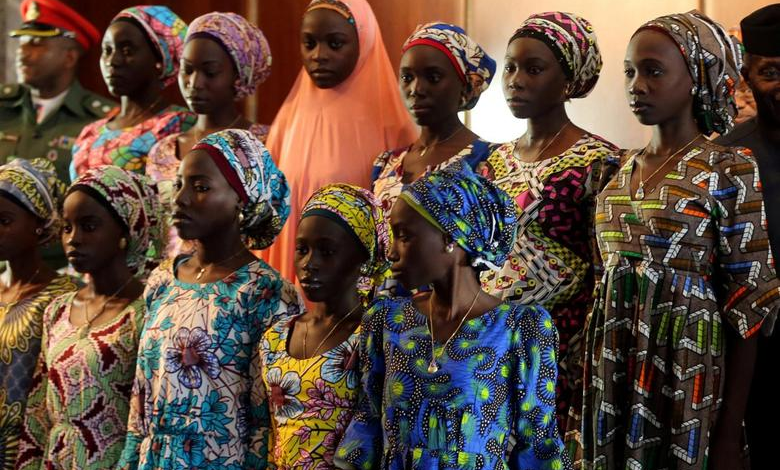Freed #ChibokGirls: ‘We Are Isolated, Treated With Contempt In School’
The freed Chibok girls in letters written on the eighth anniversary of the infamous abduction and sent to Oby Ezekwesili, a former Nigerian minister of education and co-convener of the Bring Back Our Girls (BBOG) movement, made a plea for an improvement in their living conditions.

After being held captive by Boko Haram terrorists and freed years later, schoolgirls abducted from the Chibok area of Borno, Northeast Nigeria, who are now studying at the American University of Nigeria (AUN) in neighbouring Adamawa State, say they are being isolated by their colleagues because of their background.
The students bared their minds in letters written on the eighth anniversary of the infamous abduction and sent to Oby Ezekwesili, a former Nigerian minister of education and one of the leaders of the Bring Back Our Girls (BBOG) movement. The movement has advocated for the release of the Chibok girls since 2014 when the incident happened.
“We deserve to be loved and cared for like others, because we can be better with the right place, input, and access,” wrote Falta,* who was 17 when Boko Haram abducted her and 275 others from a boarding school in Chibok.
But despite studying at one of the country’s private universities, Falta is unhappy at the university. She was frustrated at “not seeing improvement” in studying Accounting, a course she said was chosen for her by the government.
“I am studying Accounting, part 1. Though that wasn’t my choice, it was their choice, the government people, and we are not happy here,” she said in the letter.
Her education and those of others released by the insurgents are being funded under a Nigerian government scholarship scheme. The government had started a programme that would allow them to continue their education, but the lack of flexibility is a source of worry for the girls.
“I don’t like the school. We were thinking when the government said they will give us the best education anywhere of our choice, we will be given the rights to make our choices where we will be free, not looked down upon and discriminated against, as if it was our faults that we have poor education background and even to be abducted,” she said, though thanking the government for the scholarship and the rescue.
There is a growing concern that the discrimination reinforces the lingering trauma the former hostages faced during their captivity – the feeling of neglect and social exclusion that forces some of them to rethink schooling.
Unsurprisingly, Manasseh Allen, an activist who has worked with parents of the abducted girls, said two years ago that 10 of the girls had withdrawn from the programme at the AUN due to alleged lack of progress.
“Ten of them have, out of frustration, left the programme. In the school, they are isolated and not allowed to mingle, interact, and socialise with other students which would have been a means of learning, and continuous psychosocial therapy.”
Today, the figure has risen to 28.
Call for help
Falta urged the BBOG campaign’s head to come to her aid.
“Please I need your help to make my life better. I am so grateful,” she begged, promising to not let down Ezekwesili.
“If it is possible, please come and talk to us, we will be better and have more hope with access to people like you. I promise you, and tell the others, we will one day tell our story, when we have the voice and are good enough to write what is in my heart.”
Commending the BBOG for its commitments since the abduction, she said, “I read all the challenges you faced for our sake, and pains and stress you suffered. For the many challenges, we really appreciate you. Please don’t forget about the others still missing. May God bless you.”
She wants the group to pressure the government in rescuing the remaining students still in captivity with the terrorists, and in informing parents of those who died in the terrorists’ enclave.
Another student, Rose,* sang praises of Ezekwesili and the BBOG movement:
“I will never forget your strength and the challenges that you have passed through because of us; indeed, you are such a nice mother,” wrote Rose, who suffered sexual assaults and other abuses at the hands of the terrorists before she managed to escape in 2016.
Rose said she looked up to the ex-education minister for all she and her group stand for, eight years after.
“I feel that more people should strive to have the strength and passion that you exemplify in everyday life,” she said in the letter.
“It is challenging to speak out in Nigeria, walk on the street fighting for social justice and equity through love, compassion, and respect. I sincerely appreciate you and thank you for your time, support and confidence in us. Thank you for your consideration, your generosity and for inspiring us.
“It is difficult to put into words how proud I am of you and all of the wishful things I desire for you in future. I wish you much luck in your future endeavours.”
*The names of the Chibok girls in this report have been changed to protect them from harm or losing their scholarship.
Support Our Journalism
There are millions of ordinary people affected by conflict in Africa whose stories are missing in the mainstream media. HumAngle is determined to tell those challenging and under-reported stories, hoping that the people impacted by these conflicts will find the safety and security they deserve.
To ensure that we continue to provide public service coverage, we have a small favour to ask you. We want you to be part of our journalistic endeavour by contributing a token to us.
Your donation will further promote a robust, free, and independent media.
Donate HereStay Closer To The Stories That Matter




